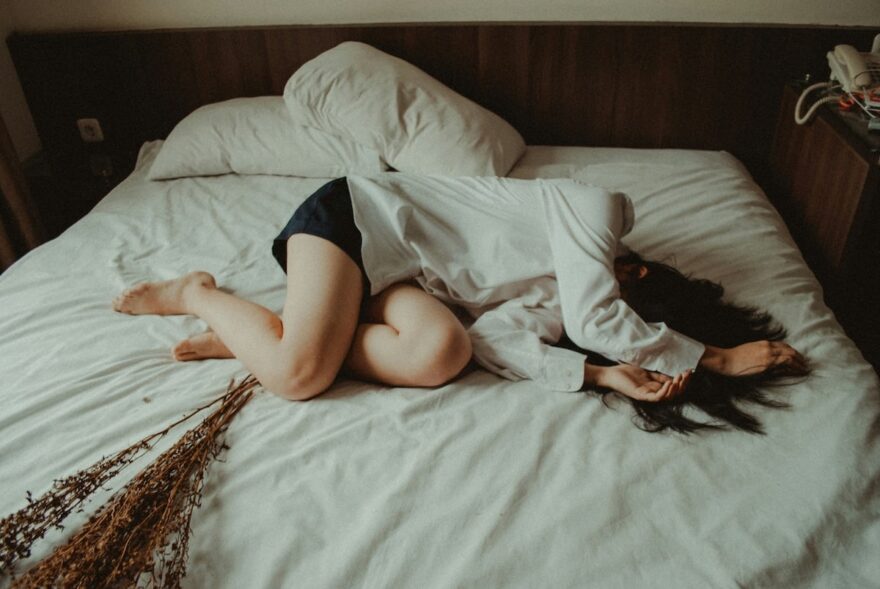Alcohol and Sleep
Understanding the relationship between alcohol and sleep is essential for maintaining a healthy lifestyle.

What’s stopping you?
Not sure if you’re ready to stop drinking? Worried about finding it difficult?
Start quizWhile alcohol is often mistakenly used in an attempt to relax or unwind, its impact on the quality of sleep can be quite negative.
Some people mistakenly use an alcoholic nightcap to fall asleep quickly, but the reality is that alcohol often leads to disrupted sleep cycles, poor sleep quality, and long-term effects on health.
In this article, we will explore the effects of alcohol and sleep, including how alcohol impacts sleep cycles, its connection to sleep disorders such as the link between alcohol and sleep apnea, and how to improve your sleep if you’ve been drinking.
- Why is Sleep So Important?
- How Does Alcohol Affect Your Sleep?
- When Should I Stop Drinking Before Bed?
- Is There a Link Between Alcohol and Insomnia?
- Alcohol, Snoring, and Sleep Apnea
- Ways to Improve Sleep After Drinking Alcohol
- Support for Alcohol Addiction
- Free online quiz
- Free videos and articles
- Other useful stop drinking articles & news
Why is Sleep So Important?
Good sleep is critical for overall health and well-being. During sleep, the body performs essential functions such as tissue repair, memory consolidation, and hormone regulation.
The lack of quality sleep can have detrimental effects on both mental and physical health, making it harder to function optimally. Here are a few reasons why sleep is so important:
-
Cognitive Function
Adequate sleep helps improve concentration, memory, and decision-making skills. Alcohol and lack of sleep can impair these cognitive functions, leading to difficulties in everyday tasks.
-
Physical Health
Sleep is essential for maintaining physical health. It helps regulate the immune system, supports heart health, and balances hormones. Chronic alcohol and sleep deprivation can increase the risk of heart disease, obesity, and diabetes.
-
Emotional Well-being
Sleep is closely linked to emotional health. A lack of sleep can lead to irritability, anxiety, and mood swings. Alcohol and bad sleep can exacerbate mental health issues, contributing to a cycle of poor sleep and poor emotional regulation.
Quality sleep is the foundation of good health, and when disrupted by alcohol, it can lead to serious consequences. Understanding how sleep and alcohol interact is essential for making informed decisions about drinking habits and sleep hygiene.
How Does Alcohol Affect Your Sleep?
The effects of alcohol and sleep are sometimes counter-intuitive. While alcohol might make you feel drowsy if you drink enough of it and that might appear to help you fall asleep quickly, it significantly reduces the quality of your sleep throughout the night.
Here’s a closer look at how alcohol disrupts the sleep cycle:
-
Reduces REM Sleep
Alcohol decreases the amount of REM (rapid eye movement) sleep, which is a crucial stage for cognitive function and memory consolidation. Reduced REM sleep leads to feelings of grogginess and fatigue, even after a full night in bed.
-
Increases Nighttime Wakefulness
After the initial effects of alcohol wear off, you may find yourself waking up frequently throughout the night. This alcohol and bad sleep cycle results in poor overall sleep quality, leaving you feeling unrested in the morning.
-
Alters Sleep Architecture
Alcohol disrupts the balance between light, deep, and REM sleep, which impacts the body’s restorative processes. As a result, alcohol and sleep deprivation often go hand in hand.
-
Dehydration and Bathroom Breaks
Alcohol is a diuretic, meaning it increases the need to urinate. This can lead to multiple trips to the bathroom throughout the night, further disrupting your sleep.
Ultimately, alcohol and sleep are not a healthy combination. While it might help you fall asleep faster, the overall quality of your sleep will be compromised, leading to fatigue and cognitive impairment the following day.
When Should I Stop Drinking Before Bed?
If you do choose to drink alcohol, timing is crucial to minimise its negative impact on sleep. The body needs time to metabolize alcohol, and drinking too close to bedtime will interfere with your sleep cycle. Here are some tips on when to stop drinking:
-
Allow 3-4 Hours Before Bed
On average, it takes the body about one hour to metabolize one standard drink. To minimize alcohol’s impact on sleep, try to stop drinking at least 3-4 hours before bed. This gives your body enough time to process the alcohol and reduces the risk of disrupted sleep.
-
Moderate Your Intake
Drinking large amounts of alcohol will increase the likelihood that alcohol will still be in your system when you go to bed. Limiting your alcohol intake in the evening can help preserve your sleep quality.
-
Stay Hydrated
Alcohol can dehydrate the body, which can lead to further disruptions in sleep. Make sure to drink plenty of water before going to bed, especially if you’ve consumed alcohol.
Timing your alcohol consumption properly can reduce its negative effects on sleep, but the best way to ensure high-quality sleep is to avoid alcohol altogether before bed.
What’s holding you back?
Not sure if you really want to quit drinking?
Need help to stop drinking?
Want to stop, but concerned that you’ll find it tough?
Worried that you’ll be deprived for the rest of your life without alcohol?
We can help you to understand and remove those fears and in so doing, make it quitting easy.
Start the free quizIs There a Link Between Alcohol and Insomnia?
Yes, there is a clear connection between alcohol and insomnia.
While alcohol might initially make you feel sleepy, it can lead to a fragmented sleep cycle and contribute to chronic insomnia.
Here’s how:
-
Disrupted Sleep Cycles
As previously mentioned, alcohol reduces REM sleep and increases nighttime wakefulness. This disruption to your sleep cycle can make it difficult to stay asleep and achieve deep, restorative rest.
-
Tolerance to Alcohol
Over time, people may develop a tolerance to alcohol, requiring more drinks to achieve the same effect. This often leads to heavier drinking, further worsening sleep quality and contributing to insomnia.
-
Withdrawal from Alcohol and Sleep
When someone addicted to alcohol reduces their intake, they may experience alcohol withdrawal and sleep problems. Insomnia is a common symptom of withdrawal, making it difficult for the body to adjust to sleeping without the effects of alcohol.
-
Anxiety and Restlessness
Drinking alcohol can increase feelings of anxiety and restlessness, which contribute to insomnia. While alcohol may seem like a quick fix to fall asleep, it often worsens sleep problems.
The relationship between alcohol and insomnia is complex, and those who MISTAKENLY use alcohol as a sleep aid often find that their sleep problems get worse over time.
Alcohol, Snoring, and Sleep Apnea
One of the more serious negative connections between alcohol and sleep is its impact on snoring and sleep disorders like sleep apnea.
Drinking alcohol and sleep apnea are closely related because alcohol affects the muscles in the throat and airway.
-
Relaxation of Throat Muscles
Alcohol relaxes the muscles that keep the airway open during sleep. This can cause the airway to become partially obstructed, leading to snoring or worsening symptoms of sleep apnea – hence the clear link between alcohol and sleep apnea.
-
Worsening Sleep Apnea Symptoms
For individuals who already have sleep apnea, alcohol can exacerbate the condition by causing more frequent and prolonged airway blockages. This makes drinking alcohol and sleep apnea a dangerous combination.
-
Increased Risk of Snoring
Even if you don’t have sleep apnea, alcohol can increase your risk of snoring, disrupting your sleep and that of your partner.
Reducing or avoiding alcohol can help alleviate symptoms of snoring and sleep apnea, improving your overall sleep quality and reducing the risk of serious health issues associated with these conditions.
Ways to Improve Sleep After Drinking Alcohol
If you’ve had a few drinks and are worried about how it might affect your sleep, there are steps you can take to improve your rest:
-
Stay Hydrated
As alcohol is a diuretic, it’s essential to drink plenty of water to counteract dehydration, which can disturb your sleep.
-
Eat a Balanced Meal
Eating before or while drinking can help slow the absorption of alcohol and reduce its effects on your sleep.
-
Create a Relaxing Sleep Environment
Make sure your bedroom is cool, dark, and quiet to promote better sleep, even if alcohol is still in your system.
-
Take a Break from Alcohol
If you’re consistently experiencing alcohol and bad sleep, consider taking a break from drinking to allow your body to recover and improve your sleep patterns.
-
Limit Alcohol Intake
The less alcohol you consume, the less it will affect your sleep. Practicing moderation can help preserve the quality of your sleep. If you have problems moderating your alcohol intake, it is wise to consider whether your alcohol consumption is problematic.
Support for Alcohol Addiction
For individuals who find it difficult to control their alcohol intake, there are various forms of support available. Whether you’re struggling with occasional binge drinking or more chronic alcohol use, reaching out for help can improve both your sleep and overall health.
-
Seek Professional Help
You can consult a healthcare provider to discuss your drinking and any underlying issues that may contribute to alcohol use. They could help you develop a tailored plan to cut back or quit safely, possibly involving medication or therapy. Very few people require medication, and using a drug-free method of quitting alcohol can actually make it easy to stop and stay stopped.
-
Join Support Groups
Organizations like Alcoholics Anonymous (AA) provide community and support for people looking to quit drinking. Connecting with others who understand your struggles can be helpful. However, why feel the need to sign up for lifelong attendance at support groups when it can be easy to quit alcohol if you deal with the psychological aspects of the addiction?
-
Cognitive Behavioral Therapy (CBT)
Therapy such as CBT can help you identify and change patterns of thought and behavior related to alcohol use.
-
Cognitive Restructuring
By changing the way you think about alcohol, particularly correcting the flawed belief system that addiction creates, it can not only be easy to quit alcohol – but enjoyable too.
-
Self-Help Book
Many people have quit alcohol using self-help books such as Allen Carr’s Easyway to Quit Emotional Drinking, which helps people understand how they can cope with the emotional aspects of life without feeling the need to drink alcohol.
Ultimately, the health benefits of quitting alcohol are numerous and long-lasting. Whether you’re interested in taking a break for a short period or committing to a life free of alcohol, the rewards are clear.
Even if you only experience the health benefits of quitting alcohol for 30 days, you’ll likely notice improvements in your energy, mood, and physical well-being. With the right resources and support, anyone can achieve a healthier, alcohol-free life.
If alcohol and sleep problems are affecting your quality of life, seeking support can help you regain control of your health and improve your sleep patterns for the long term.There is an easy way to enjoy better sleep and an easy way to quit alcohol.
Are you worried that you are drinking too much alcohol or that you’re an alcoholic? It is easy to find out whether or not you need some help with alcohol.
Free Online Quiz





